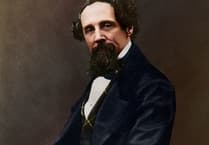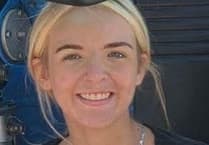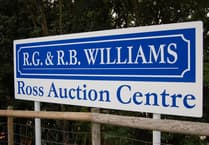MICHAEL Palin has homed in on a tragic tale involving his own family for his latest book - about his great-uncle who grew-up in the Wye Valley.
With Remembrance Day this weekend, Great Uncle Harry tells the tale of Harry Palin from Linton, near Ross-on-Wye, who died at the Battle of the Somme in 1916.
The Monty Python legend’s great-grandfather Rev Edward Palin - Harry’s father - was vicar of Linton church from 1867 to 1903, and his gravestone in the churchyard also carries the name of his youngest son, who is commemorated on a wall at the Caterpillar Valley cemetery in France but who doesn’t have a grave.
Sir Michael - whose middle name is Edward - said of his new work: “I’ve been fascinated by Great-Uncle Harry ever since photos of him and the diaries he kept before his death in the Battle of The Somme were passed down to me.
“He died young. His life snuffed out at the same age I was when we filmed Monty Python and The Holy Grail.
“It was a short life but one that encompassed an amazing period of history. From the peak of Victorian achievement to its disastrous collapse into the mud and slaughter of World War One.
“Writing a family story is something new for me. It took a lot of research and ended with a visit to France to see the spot where Harry was killed.
“But the story began much earlier when Harry’s father, my great-grandfather, married an Irish orphan.
“She was born in the Great Famine, her son died in the Great War.
“In the book I try to piece together what happened to them in between, to try and find how my family dealt with golden opportunities and desperate disappointments.
“It’s been a great learning experience. I hope it’ll be a great reading experience.”
It has already featured as ‘Book of the Week’ on Radio 4, having been a labour of love over several years for Michael, who has visited St Mary’s in Linton to see where his great grandfather was vicar and is buried and where Harry - christened Henry William Bourne Palin - grew up.
His interest started when a stash of family records was handed down to him, among which were photos of an enigmatic young man in army uniform, as well as photos of the same young man as a teenager looking uncomfortable at family gatherings.
This he learned was his Great-Uncle Harry, born in 1884.
He had previously had no idea that he had a Great-Uncle Harry, much less that his life was cut short at the age of 32 when he was killed in the Battle of the Somme.
The discovery both shocked him and made him want to know much more.
The quest that followed involved hundreds of hours of painstaking detective work.
Michael dug out every bit of family gossip and correspondence he could and studied every relevant official document.
He tracked down what remained of his great-uncle Harry’s diaries and letters, and pored over photographs of First World War battle scenes to see whether Harry appeared in any of them.
He walked the route Harry took on that fatal, final day of his life amid the mud of northern France.And as he did so, a life that had previously existed in the shadows was revealed to him.
Book publisher Hutchinson Heinemann says: “Great-Uncle Harry is an utterly compelling account of an ordinary man who led an extraordinary life.
“A blend of biography, history, travelogue and personal memoir, this is Michael Palin at his very finest.”
On visiting Harry’s home village of Linton, Michael previously revealed in The Church Times: “In 1986 I received some family papers from a cousin of my father’s. Included amongst them was a diary belonging to my great grandfather, Edward Palin... a don at St John’s College, Oxford.”
An entry detailed how Edward met an adopted US orphan from the Irish potato famine, 17-year-old Brita, and despite the age difference, Rev Palin penned six years later: “We married in Paris in 1867, she has made me the happiest of men.”
The eldest of their seven children was Michael Palin’s grandfather, while the youngest was his Great-Uncle Harry.
And Michael penned after visiting the church: “I draw some sense of continuity with the past when I think of my great-grandfather addressing the congregation from the pulpit of St Mary’s.”
The 80-year-old Python first brought his great-uncle to public attention in 2008, when he presented ‘Time watch: Last Day of World War One’.
He said at the time, prior to being presented with the stash of family history he “always felt rather guilty that I didn’t know more about HWB Palin, other than that he went to Shrewsbury School, as I later did, and that he was killed in action on September 27, 1916, at the age of 32”.
He wrote at the time that those soldiers whose bodies were not found were listed on the wall of remembrance.
“This meant, in effect, that my great-uncle had been obliterated. Nothing of him, or his, was ever recovered. The eight letters carved into Portland stone are all that we have to remember him by.”
And he said after seeing the words “Palin H.W.B”, alongside some 1,200 others on the wall: “I was deeply moved. That there was so little about him affected me all the more...
“From that time on, I knew I had a duty to find out more, to drag great-uncle Harry back from the brink of obscurity.”
During the making of the programme, he discovered he was deployed to the Dardanelles where he fought in and survived the murderous Gallipoli campaign in 1915.He also stood at the spot where Harry died on that late September afternoon, between the villages of Flers and Guedecourt, fighting with the New Zealand Division that fought for 23 consecutive days in the Battle of the Somme.
And later he when he tracked down a hand-written account of Great-uncle Harry’s death, entered in a stark official report by a Sgt Gridley, and read:
“On 27th Sept L/cpl Palin and myself were in the same shell hole just before the taking of Gird Trench. Palin was just getting up to fire when he was hit through the head. I was next to him and am sure he was killed outright.”
The book has been given pride of place in the shop window of Rossiter Books in Ross-on-Wye and Monmouth.



Comments
This article has no comments yet. Be the first to leave a comment.